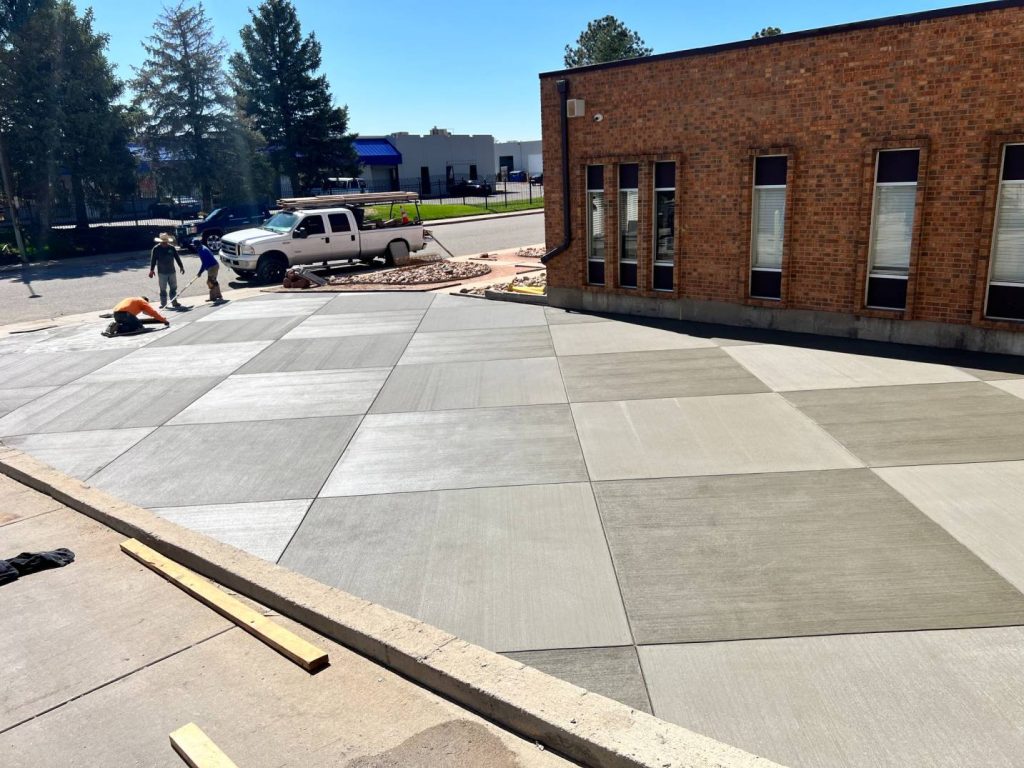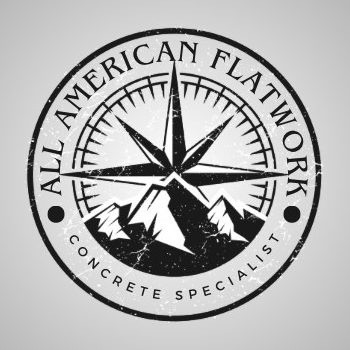In the U.S, the cost of a concrete driveway typically ranges from $3,000 and $12,000 for a two-car driveway, depending on size, design, and other factors. In terms of square footage, that’s about $6 to $15 per square foot on average. Simpler driveways with a basic broom finish on the lower end, and decorative or stamped concrete on the higher end.
Below is a quick breakdown of prices by finish type:
| Driveway Finish | Price Per Sq. Ft. | Total for 2-Car Driveway (~800 sq. ft.) |
|---|---|---|
| Standard broom finish | $8 – $11 | $6,500 – $9,000 |
| Exposed aggregate | $10 – $14 | $8,000 – $11,000 |
| Stamped concrete | $12 – $18 | $9,000 – $13,500 |
These ranges combine nationwide data and Denver-area pricing.
For example, a plain gray broom-finished driveway might cost around $5–$7 per sq. ft. nationally, whereas an elaborate stamped design with multiple colors can run $15+ per sq. ft.
In the Denver metro, many homeowners report prices around $6.50 to $7.50 per sq. ft. for a standard tear-out and replace project. Keep in mind every project is unique and your final price tag will likely be higher or lower.
Factors Affecting the Average Price of a Cement Driveway
The cost of a cement driveway isn’t one-size-fits-all. It depends on a mix of factors that go beyond just the price of concrete. Here’s what actually drives the final price tag.
1. Driveway Size and Shape
Larger driveways need more materials and labor, which drives up costs. Curved or custom-shaped designs require more time and precision, increasing the price.
2. Site Preparation and Base Work
Costs rise if the ground needs major excavation, grading, or debris removal. A solid base—often gravel and compacted sub-base—is crucial for longevity and adds to expenses.
3. Slab Thickness and Concrete Quality
Standard slabs are typically 4 in thick; thicker slabs for heavier loads cost more due to extra concrete. Higher-strength mixes or additives (like air-entrainment for freeze-thaw durability) increase material expenses.
4. Decorative Options & Finishes
Staining, stamping, sealing, or adding borders increases labor and material costs. Even color or texture treatments can add around $2–$5 per square foot.
5. Labor Rates & Local Market Factors
Contractor rates vary based on location and local demand—city areas often cost more. A more complex project with skilled labor also raises prices.
6. Permits, Drainage & Additional Features
Permits, site drainage systems, expansion joints, heating cables, or embedded lighting all add to the overall cost. These extras raise both material and labor costs
Need help measuring your space? 📏 Call us for a free quote, and we’ll take care of everything – from accurate measurements to a detailed cost breakdown.
How Much Is a 20×20 Concrete Driveway?
For a 20 ft. x 20 ft. driveway (400 sq. ft.), expect to pay roughly $3,000 to $6,000 in total. This assumes the typical $8–$15 per square foot range for a basic driveway.
On the lower end (around $3,200) you’d likely get a standard gray slab with minimal extras.
On the higher end (up to ~$6,000), you could afford a thicker slab, better reinforcement, or a decorative finish like a border or light stamping.
How Much Does a 1,000 Sq. Ft. Concrete Driveway Cost?

A 1,000 square foot driveway is fairly large (for example, about 25 ft. by 40 ft.). At current rates, 1,000 sq. ft. of concrete driveway can cost about $6,000 on the low end to $15,000 or more on the high end.
That range comes from using the per-square-foot costs of $6 (basic) up to $15 or more (decorative). For instance, if you choose a mid-range design at ~$10 per sq. ft., a 1,000 sq. ft. driveway would be around $10,000.
Should You Repair or Replace an Old Driveway?
Even the best concrete driveways can develop issues over time – Denver’s weather, soil shifting, and regular use take a toll eventually. You might be wondering whether you can fix your existing driveway or if it’s time to remove and replace it entirely.
When it Makes Sense for Repairs
If your driveway has a few cracks or surface stains, repairs may be all you need. Patching, resurfacing, or sealing can extend its life and improve curb appeal—often for a fraction of the cost of replacement. But if you’re seeing deep cracks, major sinking, or drainage issues, it’s usually more cost-effective (and safer) to tear it out and start fresh.
How Much Does it Cost to Resurface a Concrete Driveway?
Resurfacing a concrete driveway usually runs $3 to $7 per square foot. This price includes cleaning, prepping, and applying a new overlay or microtopping. It’s a cost-effective alternative to full replacement and works well for covering cosmetic cracks or dull finishes—especially on older decorative concrete.
When You Need a Completely New Driveway
Sometimes, patch jobs just won’t cut it. If your driveway has large cracks, crumbling sections, poor drainage, or uneven areas that create tripping hazards, it’s likely time to start fresh. Older driveways with failing rebar, major settling, or no proper base underneath usually cost more to repair than replace.
How Much Does it Cost to Replace a Concrete Driveway?
A full concrete driveway replacement in Denver generally costs $8 to $18 per square foot. That includes removing the old slab, grading, pouring new concrete, and adding reinforcements like rebar or wire mesh. More detailed or decorative driveway finishes (like stamped or stained concrete) can push the total higher.
If you’re unsure of whether to replace, or resurface your driveway, a quick inspection from a trusted local concrete contractor can help you weigh the pros and cons. A solid foundation is key to avoiding future repairs, so sometimes starting over is the smarter investment.
Does a Concrete Driveway Increase My Homes Value?
A well maintained, clean and aesthetic custom driveway can add curb appeal and boost your homes upfront value. In fact, three things often grab a buyer’s eye right away when they pull up: your home paint job, it’s landscaping and the driveway. An old, cracked driveway can drag down the perceived value of a property, while a clean, crack-free, nicely finished driveway makes a great first impression.
Is it Cheaper to Do a Concrete Driveway over Asphalt?
When choosing driveway materials, the most common alternatives to concrete are asphalt and gravel. Here’s a quick side-by-side comparison to see how concrete stacks up: Asphalt driveways are generally cheaper upfront than one made from concrete, but the long-term value tells a different story.
Here’s the quick breakdown:
- Asphalt driveways typically cost $3 to $6 per square foot, making them more budget-friendly at first.
- Concrete driveways usually cost $8 to $18 per square foot, especially if you choose decorative or stamped finishes.
However, concrete lasts longer—30+ years with low maintenance, while asphalt often needs resurfacing every 5–10 years. If you’re looking for durability, less maintenance, and better curb appeal (especially with decorative concrete), concrete may be more cost-effective in the long run.
Popular Concrete Driveway Styles and Their Costs
Denver’s most popular driveway finishes tend to be broom, exposed, or stamped, as they offer slip-resistance and complement the local architectural styles. Here are the most popular concrete driveway finish options – including what they are and roughly how they impact cost:
Broom Finish Concrete Driveway (Standard)
A broom finish is the classic concrete driveway surface you’ll see in many neighborhoods. It’s usually the most affordable option – generally considered the “baseline” cost for concrete driveways (around $6–$10 per sq. ft. for a basic gray broom-finished driveway). In our earlier table we noted about $8–$11 for broom finish, which in Denver typically covers a quality install with rebar reinforcement.
Exposed Aggregate Finish Prices
Exposed aggregate concrete is a decorative finish where the top layer of cement is washed away shortly after pouring to reveal the pebbles and small stones (aggregate) mixed into the concrete. The result is a textured, decorative surface with the natural color of stones adding visual interest.
Because it involves an extra finishing step and often uses special aggregates, exposed aggregate costs a bit more than a plain finish – typically in the $10–$14 per sq. ft. range (mid-range among finishes). It’s comparable in price to other basic decorative treatments.
Stamped Concrete Driveway Costs
Stamped concrete is on the higher end of the cost spectrum. Expect roughly $12–$18 per sq. ft. for a fully stamped driveway with coloring. Complex multi-color stamp jobs can even go beyond that.
However, a popular cost-saving approach is to stamp just the borders or edges of the driveway and leave the center broom-finished – this gives a beautiful framed look at a lower cost than stamping the whole slab.
Concrete Driveway Extension Costs
Extending your concrete driveway typically costs between $9 and $16 per square foot in the Denver metro area, depending on several factors. A basic extension with standard concrete usually falls on the lower end of that range, while decorative finishes like stamped patterns or colored concrete push the price higher.
Ready to Upgrade Your Driveway?
Are you thinking about replacing or installing a new cement driveway in Denver, CO? We’re here to help! Call American Flatwork for a free, no-obligation quote. We’re experienced concrete contractors serving the entire Denver metro area. We specialize in new driveway installation, repair and replacements.
We are here for honest advice to help you get the perfect cement driveway – at a fair price – that will serve your home for decades. We’re always happy to discuss options to work within your budget while still delivering a durable, high-quality result.
Frequently Asked Questions
How Long Does a Concrete Driveway Last?
Done right, a driveway made from concrete can last 30 years or more. In Denver’s climate, longevity depends on two things: proper installation and regular maintenance.
Keep in mind that external factors like soil movement, heavy vehicle traffic, and harsh weather can affect lifespan. But when you start with a solid installation and maintain it, a concrete often outlasts an asphalt one by 10–20 years.
How Much Does it Cost to Seal a Concrete Driveway?
Concrete sealing costs typically range between $1.25 and $3.00 per square foot in the Denver area. The final price depends on the size of the driveway, type of sealer used, and surface condition. Sealing helps protect decorative concrete from moisture, stains, and wear, making it a smart investment for long-term durability.
How Much Does a Heated Concrete Driveway Cost?
A heated cement driveway system can cost $12 to $25 per square foot, depending on whether you choose electric coils or a hydronic heating system. This is on top of standard driveway installation costs. While the upfront cost is higher, heated driveways offer convenience, safety, and reduce the need for shoveling snow or using harmful de-icers.
